Since 2017, the Chinese government has gradually broadened the restrictions on cryptocurrencies, including measures to clamp down on the mining and trading of this asset class. Earlier this year, the government instructed banks and payment companies not to process crypto transactions and banned mining. Now, China has made it clear that all crypto activities are considered illegal.
But what does this mean for those in the crypto industry who are increasingly working with regulators across the globe to help shape innovative frameworks that foster greater acceptance and adoption? And how do regulatory jurisdictions, governed from Singapore, London and Washington D.C. respond?
Last week, the People’s Bank of China put out a notice that said: “Trading and speculation of virtual currencies have become widespread, disrupting economic and financial order, giving rise to money laundering, illegal fund-raising, fraud, pyramid schemes and other illegal and criminal activities.” The PBOC also identified Bitcoin, Ether and Tether as being targets of its new clampdown.
Bitcoin fell as this was announced, dropping in price by US$3,600, or 7% as the news emerged.
However, Bitcoin did what Bitcoin invariably does. It rebounded, and has now fully recovered from the announcement, with on-chain data suggesting heavy accumulation by large buyers in the world’s largest cryptocurrency.
China has banned cryptocurrencies a number of times and even though the tone of this current ban seems harsher in intent than previous bans, it is having less of an impact on the market, for the moment. Elsewhere, adoption is continuing unabated, across North America, Latin America, Europe and Africa, we are only seeing interest grow in the asset class from institutions through to retail.
So, the pronouncement from Beijing, poses the important question: How do, or should other markets respond?
Opportunities for others
Beijing seems to be more serious this time and will likely be looking to impose its will more broadly, but this is only likely to present an opportunity for other regional players. Whatever China’s reasons for its latest policy actions, other jurisdictions have clearly recognized that investor appetite for crypto is not going to disappear.
Last week, the U.S. Securities and Exchange Commission’s Chairman Gary Gensler indicated that he intends to put cryptocurrencies within “the perimeter,” and other major regulatory authorities including the Financial Conduct Authority (FCA) in the U.K. and the Monetary Authority of Singapore (MAS) have put in place policies to regulate crypto service providers and protect investors as engagement and interest in the asset class continues to grow.
Many crypto companies have flocked to Singapore, known for being one of the first in the world to announce its full regulatory framework for the treatment of crypto. The MAS is currently reviewing over 170 applications from companies seeking to provide regulated crypto activities under the Payment Services Act, and it has already provided an in-principal approval to a handful of companies.
In the U.K., the FCA has conducted extensive public consultations, and has been recently providing approval to digital asset custodians, including Digivault, our own crypto custodian, which became the first stand-alone crypto custody company to receive approval to register under the FCA’s anti-money laundering and terrorist financing regulations.
The reason for this more accommodative stance is clear. Economies across the world have struggled with growth, and this explosive new industry, if regulated and managed correctly, can provide a welcome boost to countries that are focused on the future. They are offering a choice for cryptocurrency companies, who want to provide trading, investing and custody services, but are structured to do so and put necessary investor protections in place.
The future of cryptocurrencies and regulation
Any country that wishes to provide a full range of investing opportunities for its population needs to take a progressive view on this relatively new asset class. It is of vital importance that our industry engages with policy makers to explore the full potential of this new alternative asset class and provide a framework to foster greater acceptance and adoption.
It may also be argued that outright bans present further risk given the decentralized, peer-to-peer construct that characterizes cryptocurrencies, and any attempt to prohibit investing activity is only likely to push that activity underground where investor protections by key providers are less of a focus.
This latest move by China has surely created a significant opportunity for Singapore and likely many others. At EQONEX, we are the first crypto ecosystem to be listed on Nasdaq, leading the way on the next step for governance and oversight for the crypto industry. Our corporate ethos is to embrace regulation and to provide a transparent and open regulated environment for our customers to trade in with certainty. We believe that cryptocurrencies are a generational investing opportunity, and such an asset class should fall under regulatory frameworks in order to protect investors.
It’s clear that we are not alone in that view, and millions of people across the world are participating in this new industry. Of course, approaches to regulating digital currencies are at varying stages in different geographies, and while no global standard for comprehensive regulation has yet been reached, we are encouraged that many regulators outside of China are taking a progressive approach to make investing in crypto safer for everyone.




